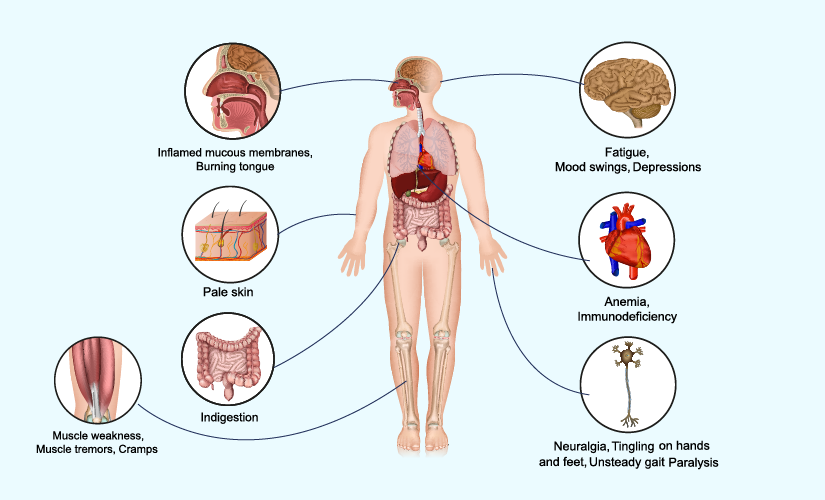Vitamin B12 is an essential nutrient that plays a crucial role in the production of red blood cells, DNA synthesis, and the proper functioning of the nervous system. A deficiency in vitamin B12 can lead to a variety of health problems, some of which can be severe if not addressed in time. This article provides a detailed overview of the symptoms of vitamin B12 deficiency, along with preventive measures to avoid this condition.
Symptoms of Vitamin B12 Deficiency
- Fatigue and Weakness:
- One of the earliest and most common symptoms of vitamin B12 deficiency is feeling unusually tired or weak. This occurs because vitamin B12 is crucial for the production of red blood cells, which carry oxygen throughout the body. Without enough red blood cells, the body may not receive adequate oxygen, leading to fatigue.
- Pale or Jaundiced Skin:
- People with a vitamin B12 deficiency may develop pale or slightly yellow skin (jaundice). This happens due to the breakdown of red blood cells, which releases a substance called bilirubin, causing a yellow tint to the skin and eyes.
- Shortness of Breath and Dizziness:
- Due to the reduced ability of the blood to carry oxygen, individuals with vitamin B12 deficiency may experience shortness of breath and dizziness, especially during physical activity.
- Nerve Problems:
- Vitamin B12 is essential for maintaining the health of nerves. A deficiency can lead to nerve damage, resulting in symptoms like numbness, tingling sensations, and a burning feeling in the hands and feet. Over time, this can lead to problems with movement and balance.
- Cognitive Issues:
- Low levels of vitamin B12 can affect the brain, leading to memory loss, difficulty thinking clearly, and even depression. In severe cases, a deficiency can contribute to cognitive decline and dementia.
- Mood Changes:
- Vitamin B12 plays a role in the production of neurotransmitters like serotonin, which regulate mood. Deficiency in this vitamin can lead to mood swings, irritability, and depression.
- Glossitis and Mouth Ulcers:
- Glossitis, or inflammation of the tongue, is a common symptom of vitamin B12 deficiency. The tongue may appear swollen, red, and painful. Some individuals may also develop mouth ulcers.
- Vision Problems:
- In severe cases, vitamin B12 deficiency can damage the optic nerve, leading to vision problems such as blurred or disturbed vision.
- Heart Palpitations:
- Some people with a vitamin B12 deficiency may experience heart palpitations, which are noticeable and irregular heartbeats.
- Anemia:
- A severe lack of vitamin B12 can lead to megaloblastic anemia, a condition where the bone marrow produces large, abnormal red blood cells that cannot function properly. This can cause symptoms like extreme fatigue, weakness, and shortness of breath.

Causes of Vitamin B12 Deficiency
- Dietary Deficiency:
- The most common cause of vitamin B12 deficiency is a lack of this nutrient in the diet. This is particularly common in vegetarians and vegans, as B12 is primarily found in animal products like meat, eggs, and dairy.
- Malabsorption:
- Some individuals may consume enough vitamin B12 but still become deficient because their body cannot properly absorb the nutrient. This can occur due to conditions like pernicious anemia, Crohn’s disease, celiac disease, or after surgery that removes part of the stomach or small intestine.
- Age:
- Older adults are at higher risk of B12 deficiency due to a decrease in stomach acid production, which is necessary for the absorption of vitamin B12 from food.
- Medications:
- Certain medications, such as proton pump inhibitors (PPIs) and metformin, can interfere with the absorption of vitamin B12.
- Genetic Factors:
- Some people may have genetic mutations that affect their body’s ability to absorb or utilize vitamin B12 efficiently.
Prevention of Vitamin B12 Deficiency
- Dietary Adjustments:
- The most straightforward way to prevent vitamin B12 deficiency is to ensure that your diet includes adequate amounts of B12-rich foods. These include:
- Meat (beef, pork, lamb)
- Fish and shellfish (salmon, tuna, clams)
- Poultry (chicken, turkey)
- Eggs
- Dairy products (milk, cheese, yogurt)
- Fortified cereals and plant-based milk (for vegetarians and vegans)
- The most straightforward way to prevent vitamin B12 deficiency is to ensure that your diet includes adequate amounts of B12-rich foods. These include:
- Supplements:
- If you are at risk of deficiency (e.g., vegetarian, vegan, older adult), taking a vitamin B12 supplement may be necessary. Supplements come in various forms, including tablets, sublingual (under the tongue) forms, and injections. It’s best to consult a healthcare provider to determine the appropriate dosage and form for your needs.
- Regular Screening:
- For individuals at higher risk of B12 deficiency, regular screening and blood tests can help detect low levels before they lead to more serious health problems.
- Address Underlying Health Issues:
- Treat any conditions that may impair vitamin B12 absorption, such as pernicious anemia or gastrointestinal disorders, with the help of a healthcare provider.
- Education and Awareness:
- Educating people, especially those following vegetarian or vegan diets, about the importance of vitamin B12 and how to obtain it can help prevent deficiencies.
- Fortified Foods:
- Consuming foods that have been fortified with vitamin B12 is another effective way to prevent deficiency. Many plant-based milk alternatives, breakfast cereals, and nutritional yeasts are fortified with B12.
- Avoid Certain Medications if Possible:
- If you’re taking medications that may interfere with B12 absorption, discuss with your doctor about possible alternatives or the need for supplementation.

Conclusion
Vitamin B12 is vital for maintaining overall health, particularly for red blood cell production, nerve function, and brain health. Deficiency in this vitamin can lead to a wide range of symptoms, some of which can be severe if left untreated. Fortunately, vitamin B12 deficiency is preventable with proper diet, supplementation, and regular monitoring. If you suspect you might be deficient, it’s important to consult a healthcare professional for proper diagnosis and treatment.





